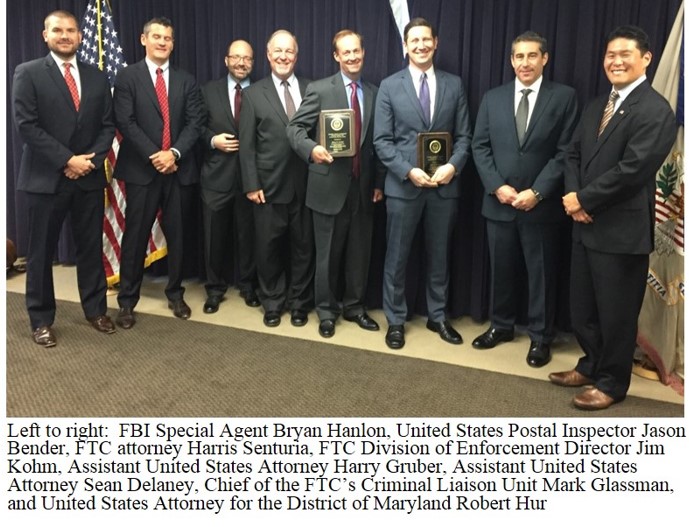Laidlaw v. Organ was an 1817 Supreme Court case concerning an allegedly deceptive trade practice affecting a small business. You may be surprised to learn who argued that case and why it’s relevant 201 years later.
Counsel for one of the businesses was a young Maryland attorney named Francis Scott Key. Yes, that Francis Scott Key. After the defense of Fort McHenry inspired him to pen The Star-Spangled Banner, he returned to his law practice and later became a United States Attorney. Today the FTC presented its Criminal Liaison Unit Prosecuting Attorney Award to Sean R. Delaney and Harry M. Gruber, Assistant United States Attorneys with the Office of the United States Attorney in Maryland. And if you can manage another coincidence, AUSAs Delaney and Gruber received the award for their efforts to bring to justice nine individuals charged with fraudulent practices that targeted small businesses. In this case, the defendants bilked offices, nonprofits, churches, and schools out of more than $50 million by sending them unordered supplies and then using arm-twisting tactics to demand payment.
 That scammy strategy should sound familiar. The FTC had previously taken action against several of the defendants and their companies in FTC v. Midway Industries. That case resulted in permanent injunctions, a $44 million judgment against one defendant, and a $58 million judgment against the rest of the lot. The FTC intends to return funds it collects to the defendants’ victims. (We also have a brochure with tips on protecting your small business from B2B scams.)
That scammy strategy should sound familiar. The FTC had previously taken action against several of the defendants and their companies in FTC v. Midway Industries. That case resulted in permanent injunctions, a $44 million judgment against one defendant, and a $58 million judgment against the rest of the lot. The FTC intends to return funds it collects to the defendants’ victims. (We also have a brochure with tips on protecting your small business from B2B scams.)
With Mr. Delaney and Mr. Gruber serving as counsel, the U.S. Attorney’s Office for the District of Maryland obtained guilty pleas to multiple fraud-related crimes from nine criminal defendants involved in the scam the FTC had challenged civilly. The defendants received varying sentences, with Eric A. Epstein sentenced more than 11 years in prison.
Every two years the FTC presents the Criminal Liaison Unit (CLU) Prosecuting Attorney Award to recognize prosecutors who demonstrate an exceptional commitment to consumer protection in partnership with the FTC. Since its inception in 2003, CLU has contributed to the successful criminal prosecution of hundreds of fraudulent telemarketers, phantom debt collectors, mortgage relief scammers, and others con artists who prey on American consumers.
One footnote: Despite Francis Scott Key’s efforts, the Laidlaw case ultimately resulted in a remand. But thanks to Mr. Delaney and Mr. Gruber, justice prevailed in this 21st century challenge to deceptive practices targeting small business. And for that, so proudly we hail our 2018 CLU Prosecuting Attorney Award honorees.

It is your choice whether to submit a comment. If you do, you must create a user name, or we will not post your comment. The Federal Trade Commission Act authorizes this information collection for purposes of managing online comments. Comments and user names are part of the Federal Trade Commission’s (FTC) public records system, and user names also are part of the FTC’s computer user records system. We may routinely use these records as described in the FTC’s Privacy Act system notices. For more information on how the FTC handles information that we collect, please read our privacy policy.
The purpose of this blog and its comments section is to inform readers about Federal Trade Commission activity, and share information to help them avoid, report, and recover from fraud, scams, and bad business practices. Your thoughts, ideas, and concerns are welcome, and we encourage comments. But keep in mind, this is a moderated blog. We review all comments before they are posted, and we won’t post comments that don’t comply with our commenting policy. We expect commenters to treat each other and the blog writers with respect.
We don't edit comments to remove objectionable content, so please ensure that your comment contains none of the above. The comments posted on this blog become part of the public domain. To protect your privacy and the privacy of other people, please do not include personal information. Opinions in comments that appear in this blog belong to the individuals who expressed them. They do not belong to or represent views of the Federal Trade Commission.
In reply to FTC is wonderful. I believe by Cheryl Hargiss
In reply to What is the purpose of FTC? I by Chloe Sheets
You can read about the FTC's history, Commissioners, Bureaus and more by clicking on the blue bar that says "About the FTC" at the top left of this page.